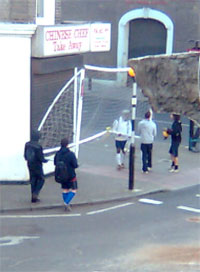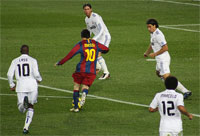Sylvia Schenk, senior advisor for sport at Transparency International reacts to FIFA’s latest anti-corruption programme.
The goalposts have moved yet again. In early January, when we were still recovering from New Year’s parties and FIFA from the scandal surrounding the award of the 2018 and 2022 World Cups to Russia and Qatar, Sepp Blatter promised to form an internal anti-corruption committee with FIFA. Back then I said that FIFA should put in place a concrete compliance programme before the election of FIFA president on 1 June.
Five months on and a few weeks before the election: no internal committee that I know of, but instead the announcement of a new external programme to tackle match-fixing.
Match fixing is certainly a serious challenge to the integrity of the world’s most popular sport, but football fans’ questions about how FIFA itself is run have not gone away.
In German there is an expression called “schnellschuss”, or “snap decision” which you could translate as a half-hearted and above all half-thought attempt to get something done quickly and painlessly – quite often just to demonstrate that you have at least done something. Like a team playing against Barcelona reduced to the occasional long-range shot on goal.
The announcement of FIFA’s cooperation with Interpol must not distract from FIFA’s well–documented lack of internal transparency. Even as I wrote this blog, new bribery allegations against four senior FIFA officials further damaged its credibility.
The fact that this announcement was such a “schnellschuss”, that came out of nowhere and – again! – with a lack of transparency (Who decided on the money? Who negotiated when the details of the programme? Has the FIFA Executive Committee been involved or was it just a presidential decision?), demonstrates very well that the workings and decision-making processes of FIFA remain opaque to the outside world.
Fighting corruption is not like playing Barcelona – you can do something about corruption. Businesses and public authorities worldwide are already putting in place simple measures to create more transparency and accountability in their operations.
Transparency is key for all this – but FIFA is still lacking this essential component of an anti-corruption plan, and really needs it if it is to change. These elections are a good chance to have a good debate about how to do it. And about how to regain credibility. With corruption allegations also surrounding past elections, FIFA and its two presidential candidates must do their utmost to prove their transparency and integrity.
Putting forward proposals before we have had the debate is putting the cart before the horse.
- First, to tackle corruption in the world of football, FIFA needs to lead by example. That means being seen to put tough internal anti-corruption measures in place and to start with a zero-tolerance approach and as much of transparency as possible.
- Second, while capacity building is important, anti-corruption measures need more than cooperation with, and funding of, international organisations, who cannot educate every football club in the world: they need to reach out to the grass roots of football.
Football clubs and fans should not wait for FIFA, they should take action now. Some already have. The German Bundesliga (Deutsche Fussball Liga) is already working with TI Germany to raise awareness and provide training for players and officials. Just last week they created an independent ombudsman as part of their Transparency and Integrity in Football project. The ombudsman will, among other things, enable whistleblowers from the world of football to report corruption. These are the kind of concrete steps needed to promote transparency that FIFA should be talking about both during and after its election.

















 Connect with us on Facebook
Connect with us on Facebook Follow us on Twitter
Follow us on Twitter